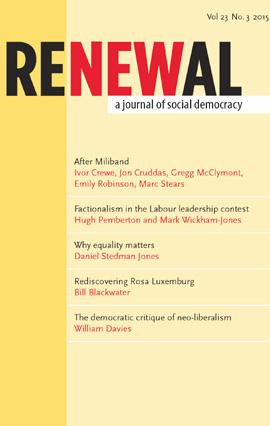
The democratic critique of neo-liberalism
Renewal - Print ISSN 0968-5211 - Online ISSN
Volume 23 Number 3 (2015)
The democratic critique of neo-liberalism
William Davies
Abstract
Since university tuition fees were first introduced in the UK by the Blair government in 1998, there has been an on-going debate as to whether the policy is more or less equitable than a graduate tax. The debate provided Gordon Brown’s camp with an opportunity to throw the occasional rock at Blairites throughout the early 2000s, and Ed Miliband (formerly of said camp) was still proposing a graduate tax when he became leader in 2010. Now that the original £1,000 annual fees have risen to a maximum £9,000, the capacity of a graduate tax to fund higher education without saddling graduates with vast debts looks more compelling than ever. Yet Miliband fought the 2015 election promising only to reduce the cap on fees, to a maximum of £6,000.
What’s interesting about how this debate played out was the philosophical schism it revealed in the centre-left. Both sides had good reason to claim theirs was the more progressive policy. The argument in favour of tuition fees rested on two crucial claims. Firstly, that higher education creates economic benefits that accrue largely to the individual graduate. State funding of universities is therefore a regressive policy, in which society (including those on low incomes) pays for the middle classes to entrench their advantages. Secondly, tuition fees could be waived for those on low incomes, as indeed they have been. Meanwhile, graduates have to reach a certain income threshold before they start paying off their debts. Put these claims together, and tuition fees look not only fair, but positively redistributive.
To cite this article
William Davies (2015) The democratic critique of neo-liberalism, Renewal, 23(3)
